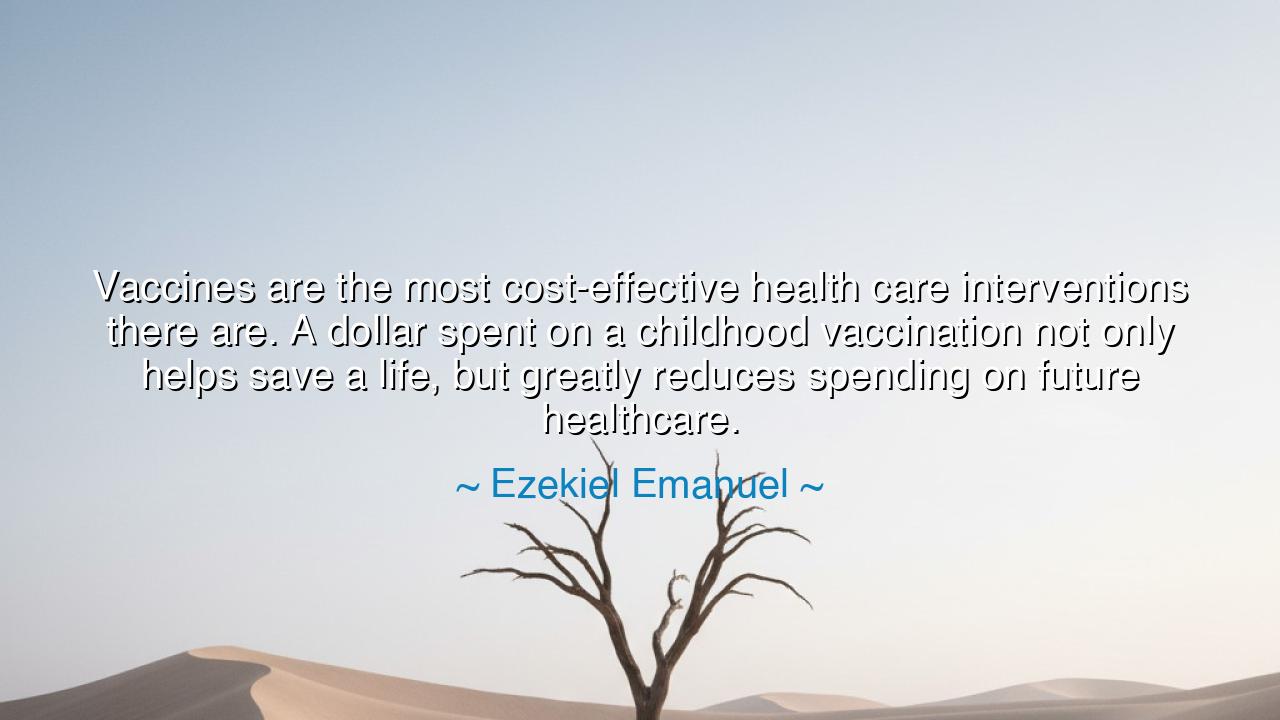
Vaccines are the most cost-effective health care interventions
Vaccines are the most cost-effective health care interventions there are. A dollar spent on a childhood vaccination not only helps save a life, but greatly reduces spending on future healthcare.






In the words of Ezekiel Emanuel, we are reminded of the profound power of vaccines, not just as a tool for preventing illness, but as an investment in the well-being of entire societies. The idea that a dollar spent on childhood vaccinations not only saves lives but also reduces future healthcare spending is a testament to the ancient wisdom that true wisdom lies in prevention. This principle was understood by the ancients, who, long before the advent of modern medicine, knew that the preservation of health was the highest form of care. In their time, they created rituals, herbs, and practices not only to cure but to prevent illness, understanding that it is far nobler and more cost-effective to prevent a wound than to heal it after the fact.
Consider the ancient Greeks, whose philosophers and physicians, such as Hippocrates, laid the foundations for modern medicine. Hippocrates, the father of medicine, spoke often of the importance of balance in life and the prevention of disease, teaching his students that the best way to fight illness was to maintain health through careful habits and practices. While they did not have the modern tools we now use, the wisdom they imparted was clear: true healthcare is not just about treatment, but about ensuring that the body remains strong and free from harm in the first place. Vaccines, though a more recent development, follow this ancient understanding—they are tools to maintain the balance of health and to protect communities from the ravages of disease.
The story of smallpox is a powerful illustration of the life-saving potential of vaccines. Smallpox, once a devastating scourge that killed millions, was eventually eradicated thanks to the work of Edward Jenner and others, who pioneered the use of the smallpox vaccine. By investing in the prevention of this deadly disease, societies around the world were able to save lives and reduce future healthcare costs dramatically. Jenner’s vaccine was the first of its kind, and its success demonstrated the profound truth that the most cost-effective way to save lives is to prevent disease before it strikes. The world, in its gratitude, no longer has to spend millions on smallpox treatments because prevention has been so successful.
The ancient wisdom of prevention is echoed in the story of Polio, another disease that was once widespread and devastating. Polio, like smallpox, crippled countless lives and cost societies vast sums in treatment and care. But through the efforts of Jonas Salk and his development of the polio vaccine, the world was able to eradicate polio from the majority of the globe. What was once a disease that brought forth untold suffering and financial burden was swiftly brought under control through preventive care. Today, the cost of polio care is virtually nonexistent in many parts of the world, thanks to the investment in a simple vaccine. This is the essence of Emanuel's quote—vaccines are a small price to pay for the immense benefits they provide.
Emanuel’s assertion is not merely a statement of fact but a call to recognize the power of prevention in shaping the future. By investing in vaccines, we are not merely spending money on medicine—we are saving lives and preventing the immense costs that would come with future healthcare needs. Vaccines create a ripple effect, benefiting not only the individuals who receive them but also their families, their communities, and the societies at large. By reducing the burden of disease, we free up resources that can be better spent on other important areas, from education to innovation. This is the wisdom of investing in the future, a principle that has guided successful societies for centuries.
The lesson we can take from this is clear: our future well-being depends on the actions we take today to prevent illness. Whether through vaccines, healthy living, or wise policies, the choices we make now shape the world to come. The ancients knew that a wise society is one that invests in its future, not just by reacting to illness, but by preventing it before it arises. We, too, must continue to embrace this wisdom, supporting vaccination efforts and the prevention of disease, understanding that every dollar spent today is an investment in a healthier, more prosperous tomorrow.
In our own lives, let us reflect on the principle of prevention—both in our health and in the world around us. Just as vaccines prevent suffering and reduce costs, so too can our daily choices prevent future hardships. Whether it’s in our personal well-being, in our communities, or in the environment, taking steps to prevent harm today ensures a future where we can thrive without the burden of preventable problems. Let us, like the ancients, strive not just to treat the sick, but to ensure that future generations live with the health and prosperity that we have the power to create today.






AAdministratorAdministrator
Welcome, honored guests. Please leave a comment, we will respond soon